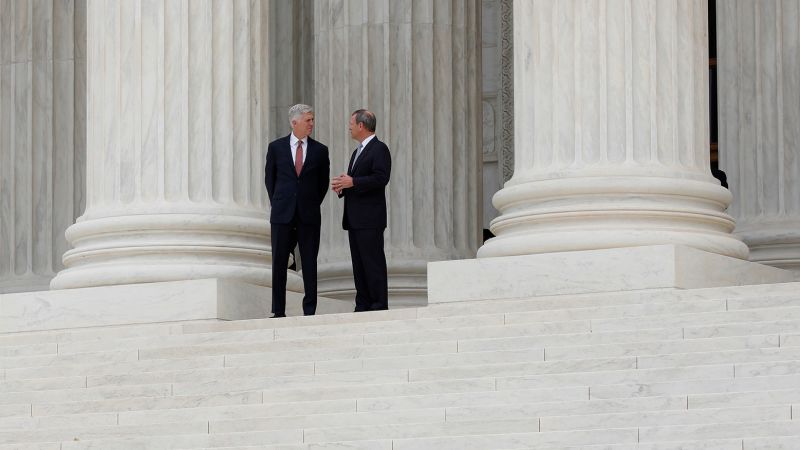
The Supreme Court’s decision to address transgender sports bans has placed Chief Justice John Roberts and Justice Neil Gorsuch in the spotlight. This development follows their previous involvement in cases concerning LGBTQ rights, and their upcoming decisions could significantly impact the legal landscape.
Both Roberts and Gorsuch have previously authored majority opinions involving transgender Americans, yet they refrained from expressing their views on sports-related cases last month. This was evident in the Supreme Court’s ruling that upheld Tennessee’s ban on puberty blockers and hormone therapy for transgender youth.
Background on the Supreme Court’s Involvement
The Supreme Court’s engagement with transgender issues comes amid a heated political climate. This is the second consecutive year the court tackles disputes involving young transgender Americans, who face increasing political backlash, partly fueled by former President Donald Trump and conservative states.
Currently, the court is set to hear appeals in two cases challenging laws in West Virginia and Idaho. These laws prohibit transgender girls and women from participating in women’s sports teams, including a case initiated by a middle school student.
Previous Rulings and Their Implications
Last month’s decision in US v. Skrmetti avoided addressing fundamental questions about transgender rights, which will be more challenging to sidestep in the upcoming sports cases. Legal experts suggest that the focus will be on Roberts and Gorsuch, given their past rulings.
“Even though the court ruled against the transgender plaintiffs in Skrmetti, it did not decide the larger and more important question of whether discrimination based on transgender status triggers more searching judicial review,” said Steve Vladeck, CNN Supreme Court analyst and professor at Georgetown University Law Center.
The court’s 6-3 decision in June to uphold Tennessee’s ban was limited in scope. Roberts’ opinion avoided determining whether the law discriminated against transgender youth, focusing instead on age and medical procedures as regulatory boundaries.
Challenges Ahead in the Sports Cases
Experts believe the court will find it difficult to avoid broader questions in the sports cases. Suzanne Goldberg, a Columbia Law School professor, noted that the new cases present discrimination questions that are hard to ignore.
“It’s important not to lose sight of the fact that these cases involve kids trying to make their way through school and life like every other kid,” Goldberg emphasized.
Justice Gorsuch’s Role and the Bostock Decision
Gorsuch, who joined the majority opinion in the Tennessee case, did not write separately to clarify his stance. His silence is noteworthy given his authorship of the landmark 2020 decision in Bostock v. Clayton County, which extended federal protections against sex discrimination to transgender workers.
The Biden administration and transgender teenagers argue that the logic in Bostock should apply to gender identity care bans. However, the court has not extended this reasoning beyond the workplace, facing criticism from conservative circles.
Conservative Justices and Potential Outcomes
John Bursch, a senior counsel at the conservative Alliance Defending Freedom, predicts that Roberts and Gorsuch may support state bans on transgender sports participation, given their votes in the Tennessee case.
“If they were in agreement that Tennessee’s law did not discriminate based on gender identity, I would assume that both of them would come to the same conclusion here when it comes to sports,” Bursch stated.
Meanwhile, other conservative justices have signaled their views on anti-trans laws. Justice Amy Coney Barrett, in a concurring opinion, opposed granting transgender status the same protections as race and sex under the 14th Amendment.
Legal and Social Implications
Justice Brett Kavanaugh, often seen as a swing vote, raised questions about the implications of these cases for women’s and girls’ sports. During oral arguments, he questioned the constitutional rights of transgender athletes to participate in sports consistent with their gender identity.
“Would transgender athletes have a constitutional right, as you see it, to play in women’s and girls’ sports, basketball, swimming, volleyball, track, et cetera, notwithstanding the competitive fairness and safety issues?” Kavanaugh asked.
The court’s three liberal justices dissented in the Tennessee case, with Justice Sonia Sotomayor criticizing the majority for abandoning transgender children to political whims.
Cases from West Virginia and Idaho
In West Virginia, the “Save Women’s Sports Act” bans transgender women and girls from participating in public school sports teams aligned with their gender identity. Becky Pepper-Jackson, a sixth grader, filed a lawsuit against this ban, alleging violations of federal law and the Constitution.
The 4th US Circuit Court of Appeals ruled that West Virginia’s ban violated Pepper-Jackson’s rights under Title IX. Similarly, in Idaho, Lindsay Hecox challenged a state sports ban, leading to a federal district court blocking the law’s enforcement against her.
State officials in both West Virginia and Idaho have praised the Supreme Court’s decision to hear these cases, viewing them as opportunities to affirm their policies.
The Supreme Court is expected to hear arguments later this year or in early 2026, with a decision anticipated by June. The outcomes will likely have significant implications for transgender rights and the broader legal landscape in the United States.




